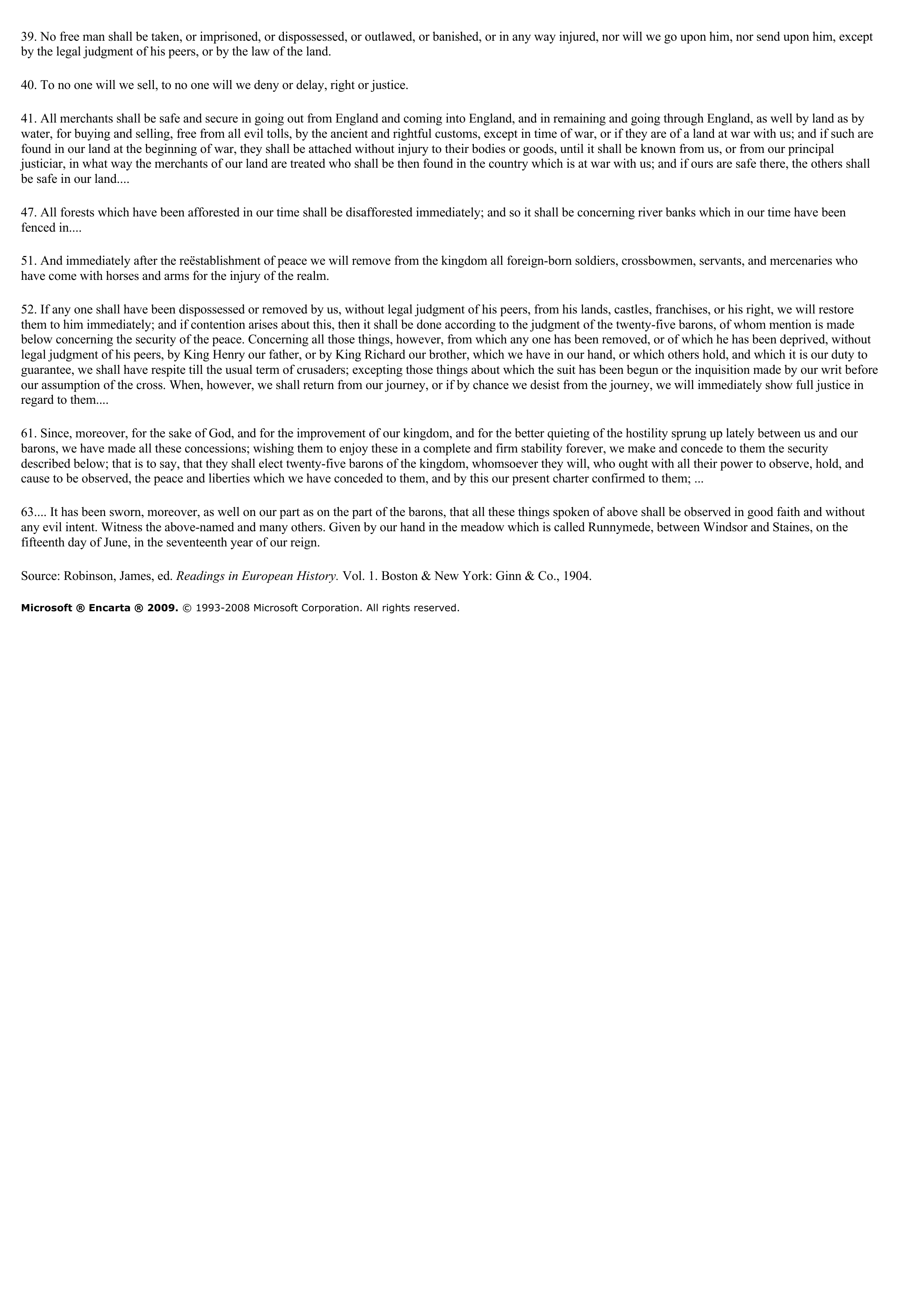Principal Provisions of the Magna Carta The Magna Carta was signed by King John of England in response to the complaints of his barons, and thus its emphasis is on the limits of royal authority and the proper relationship between king and subject.
Publié le 26/05/2013

Extrait du document
«
39.
No free man shall be taken, or imprisoned, or dispossessed, or outlawed, or banished, or in any way injured, nor will we go upon him, nor send upon him, exceptby the legal judgment of his peers, or by the law of the land.
40.
To no one will we sell, to no one will we deny or delay, right or justice.
41.
All merchants shall be safe and secure in going out from England and coming into England, and in remaining and going through England, as well by land as bywater, for buying and selling, free from all evil tolls, by the ancient and rightful customs, except in time of war, or if they are of a land at war with us; and if such arefound in our land at the beginning of war, they shall be attached without injury to their bodies or goods, until it shall be known from us, or from our principaljusticiar, in what way the merchants of our land are treated who shall be then found in the country which is at war with us; and if ours are safe there, the others shallbe safe in our land....
47.
All forests which have been afforested in our time shall be disafforested immediately; and so it shall be concerning river banks which in our time have beenfenced in....
51.
And immediately after the reëstablishment of peace we will remove from the kingdom all foreign-born soldiers, crossbowmen, servants, and mercenaries whohave come with horses and arms for the injury of the realm.
52.
If any one shall have been dispossessed or removed by us, without legal judgment of his peers, from his lands, castles, franchises, or his right, we will restorethem to him immediately; and if contention arises about this, then it shall be done according to the judgment of the twenty-five barons, of whom mention is madebelow concerning the security of the peace.
Concerning all those things, however, from which any one has been removed, or of which he has been deprived, withoutlegal judgment of his peers, by King Henry our father, or by King Richard our brother, which we have in our hand, or which others hold, and which it is our duty toguarantee, we shall have respite till the usual term of crusaders; excepting those things about which the suit has been begun or the inquisition made by our writ beforeour assumption of the cross.
When, however, we shall return from our journey, or if by chance we desist from the journey, we will immediately show full justice inregard to them....
61.
Since, moreover, for the sake of God, and for the improvement of our kingdom, and for the better quieting of the hostility sprung up lately between us and ourbarons, we have made all these concessions; wishing them to enjoy these in a complete and firm stability forever, we make and concede to them the securitydescribed below; that is to say, that they shall elect twenty-five barons of the kingdom, whomsoever they will, who ought with all their power to observe, hold, andcause to be observed, the peace and liberties which we have conceded to them, and by this our present charter confirmed to them; ...
63....
It has been sworn, moreover, as well on our part as on the part of the barons, that all these things spoken of above shall be observed in good faith and withoutany evil intent.
Witness the above-named and many others.
Given by our hand in the meadow which is called Runnymede, between Windsor and Staines, on thefifteenth day of June, in the seventeenth year of our reign.
Source: Robinson, James, ed.
Readings in European History. Vol.
1.
Boston & New York: Ginn & Co., 1904.
Microsoft ® Encarta ® 2009. © 1993-2008 Microsoft Corporation.
All rights reserved..
»
↓↓↓ APERÇU DU DOCUMENT ↓↓↓
Liens utiles
- Magna Carta I INTRODUCTION Magna Carta (Latin, "Great Charter"), document sealed by King John of England on June 15, 1215, in which he made a series of promises to his subjects that he would govern England and deal with his vassals according to the customs of feudal law (see Feudalism).
- John Winthrop: "A City Upon a Hill" In 1629 English attorney and Puritan John Winthrop was chosen by the Massachusetts Bay Company, an English trading firm, to govern its colony in New England.
- Iphicles Greek Halfbrother of the hero Heracles; son of Amphitryon, a prince of Tiryns, and his wife, Alcmene, who was a daughter of the king of Mycenae; husband to Automedusa, and later, to the youngest daughter of King Creon of Thebes.
- Islamic Art and Architecture I INTRODUCTION Córdoba Mosque Courtyard This mosque and courtyard with its repeated horseshoe arches was built between the 8th and 10th centuries in Córdoba, Spain.
- Robinson Crusoe (extrait) Daniel Defoe (...) In a little time I began to speak to him, and teach him to speak to me; and, first, I made him know his name should be Friday, which was the day I saved his life.

































